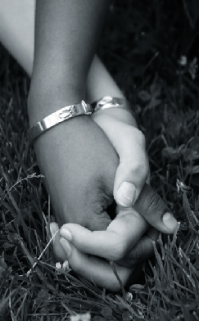It was almost summer break during high school, the year I’d come out. I was on a date. With a girl. Who I liked. Who liked me.
We met in the gay neighborhood of our city. Here, no one cared that we held hands, that Aisha was black and I was Hapa (half Asian), or that we both were girls. They didn’t want us to “do whatever we do behind closed doors” or “keep our private lives private” or any of those other phrases thrown into the discourse by people whose tolerance stops just short of acceptance. Mostly, they wanted us to make a decision about where we were going to eat and to stop loitering in the thrift store.
I didn’t think I’d be judged, especially by someone I knew, or that my life(“style”) would affect anyone else. I didn’t see my friend’s mom drive past us as we held hands on the corner, waiting for the light to change.
I had a crush on my friend Nina before I even came out. Nina’s mom, a member of black Christian church, was afraid I would “turn” her daughter after seeing me in the gay neighborhood holding hands on a date with another queer woman of color. I got along with her mother otherwise. As a single mother, she was determined to do everything in her power to ensure her daughter grew up strong, successful, and straight.
I can theorize that if I’d been with a white girl, Nina’s mom could see queerness as an out-group issue that  wouldn’t affect her family or community. Or that if she hadn’t been divorced herself, she could chalk it up to the lack of a strong male presence in my own life. As it was, she believed the reality of my proximity to her daughter was nothing less than a threat.
wouldn’t affect her family or community. Or that if she hadn’t been divorced herself, she could chalk it up to the lack of a strong male presence in my own life. As it was, she believed the reality of my proximity to her daughter was nothing less than a threat.
After seeing me that day, her mother discouraged her from spending too much time with me and we were forbidden from having sleepovers. If Nina hadn’t explained it to me, I never would have understood why.
Thankfully, we remained friends, albeit outside of her mother’s eyes. A sleepover with me, as platonic and secretive as it was, became an act of defiance and of her defining herself and her own boundaries. Her loyalty as a friend, despite her mother’s concern, was enough to ensure me that she was someone I could trust to be there for me through thick and thin, a rock amidst the chaos of my finding myself and finding comfort in her consistency.
Eventually, a couple of years later, Nina came out herself and has been much happier and more outgoing as she’s become more comfortable in her own skin. It was finally my turn to support her.
After going away to college, Nina came out to her mom, who is still struggling to accept her daughter’s orientation. Through is all, NIna remains a strong and successful in her own right. I just hope it doesn’t take her family much longer to all that I see in her.
And you reader? Have you faced a similar situation? How did you address it? What can we do, as a community of queer women of color, to support our sisters? How do we create our own families and then engage the ones we were born into?
* All names have been changed to ensure anonymity.
This is crazy, but I guess common.
My roommate is afraid her parents will freak out if they know a trans-woman is living in their house that we both pay rent in.
At first, I was, like, “Why not just tell them what I identify as anyway–a WOMAN?” I felt that she had exploited me in a bit, but then relegated it to the whole situation just being a reflection of her and her own insecurities with her own sexuality.
Thanks for engaging as a reader, Amanda! I’m curious what you mean by that she had exploited you, and what you see that makes you sure she’s insecure about her own sexuality? Thanks for sharing!
Aleta…
.. I am so sorry for such a late response.
I mean that she [the ex-roommate] exploited mys exuality for her makeshift documentary in an effort to explain to her parents that SHE is not okay.
It’s psycologically (sp??) textbook … we are in a world that spouts “Change, change” when things don’t go our way, but in reality we feed into the very system that FEEDS on our insecurities as humans.
It’s quite esoteric and maybe … ridiculous… but all the same.. REAL. :-/
Why is it that m daughter will not talk to me about her orientation, although she shares with others that she has come out. If you’re an adult, sure about who you feel you are, shares with everyone else in the world; why do you leave it for someone else to tell your mother or for her to guess? Why do you distance your relationship with your mother by trying to keep it a secret, when in the past your have been open with her about most of life’s situations.
It’s troubling to read about the fears of recruiting, but I’m glad your friend was able to come to terms with her identity.